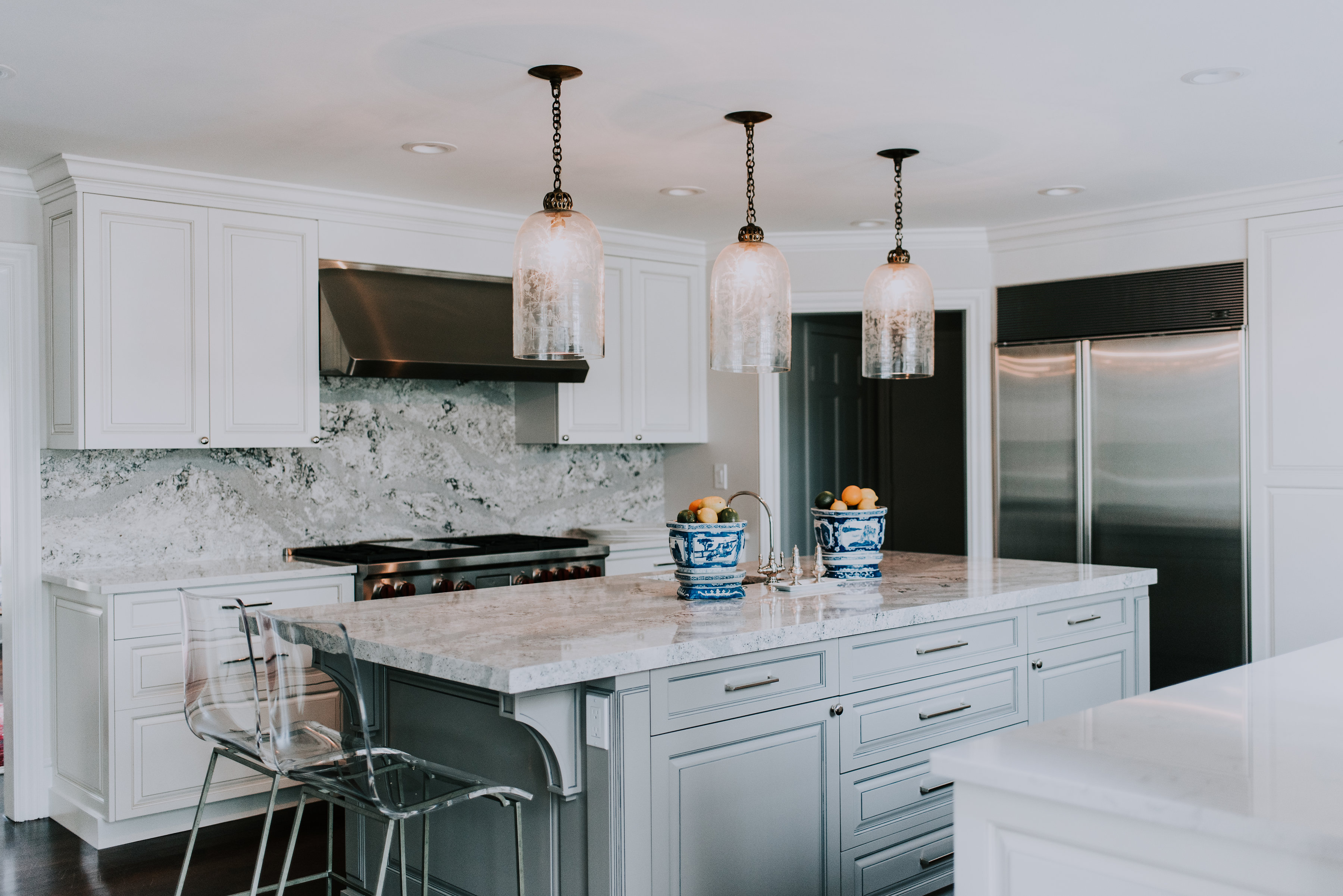How much does a quartz countertop cost?
Wondering how much a quartz countertop costs? They’re attractive, hygienic and easy to care for so get the full lowdown


Get small space home decor ideas, celeb inspiration, DIY tips and more, straight to your inbox!
You are now subscribed
Your newsletter sign-up was successful
How much does a quartz countertop cost? It’s an appealing choice for a kitchen, whether you‘re remodeling your kitchen, or swapping out an old countertop for a new version. And you’ll want to know what you need to budget for the new surface.
Quartz countertops are engineered stone. In other words, they’re made with natural stone but this is combined with resins and pigments to create the slabs. The process results in a countertop that’s durable, and doesn’t need periodic resealing. It can look just like natural stone, or concrete, and there are a host of other looks, too to consider as part of your kitchen remodel ideas.
But if you’ve fallen for all these benefits, you’ll want to know what you might expect to pay for quartz, how much installation costs, and whether you can save by DIYing, and we’ve got the answers you need.
How much does a quartz countertop cost?
Quartz is an easy-to-care for as well as attractive material for countertops. ‘Quartz is without a doubt the most popular countertop material in the US – and with good reason,’ says Jason Quint, owner of Central Florida kitchen design studio Signature Kitchens.
‘Its non-porous nature makes it a very clean and stain-resistant surface and because it is manmade the styles tend to match natural stones like marble but don’t have any of the drawbacks.’
But how much does a quartz countertop cost if this is the option you take? ‘Installing quartz countertops costs $4,500 on average, including materials and installation costs,’ says Bailey Carson, home care expert at Angi. ‘The total cost of the project will depend on the particular cut of quartz and your location.’
Although quartz is often a countertop option you might consider alongside natural stone, the pricing structure is different, explains Adam Graham, a construction industry analyst at Fixr. ‘The material is manufactured, so costs aren’t based on rarity like they are with natural stone. Nor are they based on how fragile a material is or how difficult it is to get a large slab of it like some more delicate stones.’
Get small space home decor ideas, celeb inspiration, DIY tips and more, straight to your inbox!
The total cost of a quartz countertop actually involves several elements. ‘It includes the template, material, fabrication, and installation, but the pricing may vary based on the brand, design, and color,’ explains Kerry Sherin, a consumer advocate at Ownerly.
What are the installation costs for quartz countertops?
If you opt for quartz countertops, expect to pay between $70 and $100 per square foot for installation or $1,500 and $12,000 for the entire project, says Bailey Carson.
Bear in mind that the edge detailing you select can have an influence on your kitchen remodel costs. ‘A bullnose edge or a mitered edge could add $10 to $30 per linear foot,’ says Jason Quint.
Can you install a quartz countertop yourself?
You might be considering DIY installation of a quartz countertop to reduce your costs, but is it a good idea? ‘Installing new countertops is a difficult task that usually requires a pro,’ says Bailey Carson. ‘Quartz slabs are extremely heavy and difficult to move, so at the very least, you will need other people to help you.’
Jason Quint explains, ‘A slab weighs upwards of 700 pounds and you’ll need not only specialized equipment to handle that weight, but you’ll also want experienced people who regularly deal and move objects that heavy. A DIY install is a recipe for damaging your cabinetry, the slab itself, you and the rest of your home. Let the professionals do what they do best. Plus you aren’t saving all that much, installation is the lowest cost element.’
Or you could even try ways to cover kitchen countertops with a quartz look.
How can you save on quartz countertops?
Quartz countertops are not a low-cost option for the kitchen, but there are ways to spend less. ‘Quartz is often sold by the slab or half slab depending on the fabricator,’ explains Jason Quint.
‘Some fabricators have stocking programs where there is a limited selection of styles, but you only pay for what you need which is a great savings opportunity. One of the fabricators we work with has six tiers that start at $48 and go up to $105 per square foot, this cost includes the material, fabrication and installation of the countertops.’
Pay attention to the details as well if you want to spend less. ‘You can save money on your quartz countertop by opting for a budget-friendly straight edge, a simple shape that will require less cutting and a standard surface mount sink attachment,’ suggests Volodymyr Barabakh, co-founder and project director of building contractors Structural Beam.
‘Choosing natural colors will also save you money as they are easier to source than those with intricate patterns.’
Be quality aware, however. ‘The hardness and quality of quartz on the market differs,’ says Kerry Sherin. ‘In order to meet the lower-priced market, manufacturers are forced to alter resin to quartz ratios, quality inspection, manufacturing processes, and warranties.’
Always select quartz from a reputable manufacturer to be sure it will perform as it should. ‘I would remember the time-honored saying: if it’s too good to be true, it probably is,’ says Jason.
Which is more expensive, quartz or granite?
The costs of granite countertops and quartz can be relatively similar, but those for granite have a wider range. ‘Granite countertop costs may start around $40 a square foot for some very basic stones, but their average costs are over $100 a square foot installed, and some exotic stones can go as high as $400 a square foot,’ says Adam Graham.
They’re both attractive and durable options for countertops, but be aware that granite does require maintenance, which brings costs down the line. ‘Granite is more porous, so it needs to be sealed once per year, while quartz does not,’ says Bailey Carson.
Case study: An Ohio kitchen
In this Moreland Hills, Ohio kitchen designed by Dawn Cook of BLDC Design Cambria quartz was used for the countertops, bar, and a full height backsplash. The cost was $15,000.

Sarah is a freelance journalist and editor writing for websites, national newspapers, and magazines. She’s spent most of her journalistic career specialising in homes – long enough to see fridges become smart, decorating fashions embrace both minimalism and maximalism, and interiors that blur the indoor/outdoor link become a must-have. She loves testing the latest home appliances, revealing the trends in furnishings and fittings for every room, and investigating the benefits, costs and practicalities of home improvement. It's no big surprise that she likes to put what she writes about into practice, and is a serial house revamper. For Realhomes.com, Sarah reviews coffee machines and vacuum cleaners, taking them through their paces at home to give us an honest, real life review and comparison of every model.